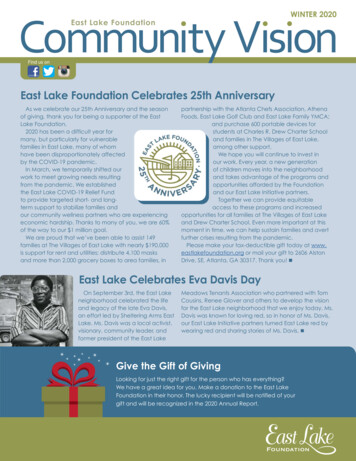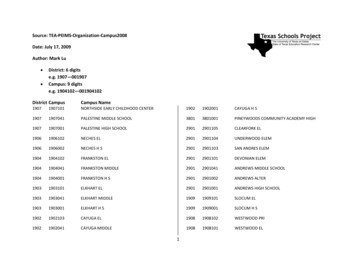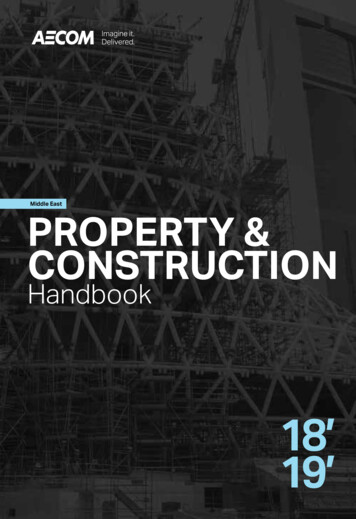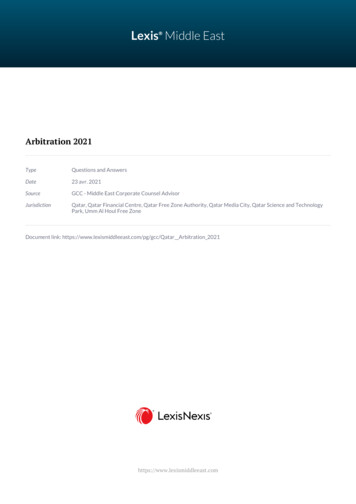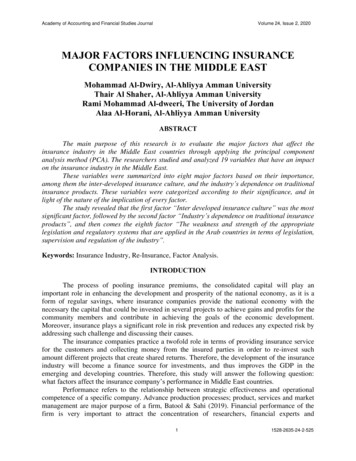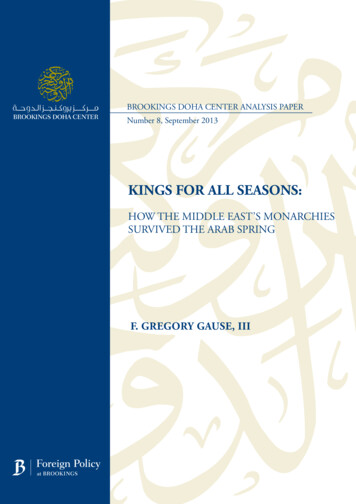
Transcription
BROOKINGS DOHA CENTER ANALYSIS PAPERNumber 8, September 2013KINGS FOR ALL SEASONS:HOW THE MIDDLE EAST’S MONARCHIESSURVIVED THE ARAB SPRINGF. GREGORY GAUSE, III
BrookingsThe Brookings Institution is a private non-profit organization. Its mission is to conduct high-quality,independent research and, based on that research, to provide innovative, practical recommendationsfor policymakers and the public. The conclusions and recommendations of any Brookings publication are solely those of its author(s) and do not reflect the views of the Institution, its management,or its scholars.Copyright 2013THE BROOKINGS INSTITUTION1775 Massachusetts Avenue, N.W. Washington, D.C. 20036 U.S.A.www.brookings.eduBROOKINGS DOHA CENTERSaha 43, Building 63, West Bay, Doha, Qatarwww.brookings.edu/about/centers/doha
TableofContentsI. Executive Summary .1II. Introduction .3III. “Just Wait, They Will Fall” .5IV. The Strange Case of Monarchical Stability .8Cultural Legitimacy .8Functional Superiority: Performance and Reform .12V. Monarchical Political Reform: Individual v. Dynastic Monarchies .15The Individual Monarchies .15The Dynastic Monarchies .18VI. Explaining Monarchical Stability .24VII. The Long-Term Effects of the Arab Awakening on the Monarchs.28VIII. Monarchical Stability and American Policy .30
About The AuthorF.Gregory Gause, III is a nonresident senior fellow at the Brookings Doha Center andprofessor of political science at the University of Vermont. He specializes in the domesticpolitics and international relations of the Gulf countries, with a particular focus on Saudi Arabia.He is author of The International Relations of the Persian Gulf (Cambridge University Press,2010), as well as two other books and numerous articles and book chapters.Gause was previously on the faculty of Columbia University (1987-1995) and was Fellow forArab and Islamic Studies at the Council on Foreign Relations in New York (1993-94). He wasKuwait Foundation Visiting Professor of International Relations at the Kennedy School ofGovernment, Harvard University (2009-10) and a Fulbright Scholar at the American Universityof Kuwait (2009).About The Brookings Doha CenterBased in Qatar, the Brookings Doha Center is an initiative of the Brookings Institution in Washington, D.C., that advances high-quality, independent policy analysis and research on the MiddleEast. The Center maintains a reputation for policy impact and cutting-edge, field-oriented research onsocio-economic and geopolitical issues facing the broader Middle East, including relations with theUnited States.The Brookings Doha Center International Advisory Council is co-chaired by H.E. Sheikh Hamad binJassim bin Jabr Al Thani, former prime minister and minister of foreign affairs of the State of Qatar,and Brookings President Strobe Talbott. The Center was formally inaugurated by H.E. Sheikh Hamadbin Jassim bin Jabr Al-Thani on February 17, 2008. It is funded by the State of Qatar. Salman Shaikhserves as its director.In pursuing its mission, the Brookings Doha Center undertakes research and programming that engages key elements of business, government, civil society, the media, and academia on key publicpolicy issues in the following four core areas:(i) Democratization, political reform, and public policy; (ii) Middle East relations with emerging Asiannations, including on the geopolitics and economies of energy; (iii) Conflict and peace processes in theregion; (iv) Educational, institutional, and political reform in the Gulf countries.Open to a broad range of views, the Brookings Doha Center is a hub for Brookings scholarship in theregion.
Executive SummaryNo Arab monarchy has fallen during theArab uprisings, and only one – Bahrain– has had a regime-shaking crisis. Theseregimes, written off for decades as anachronisms, weathered the region’s political stormbetter than their republican neighbors. Thescholarly and expert reactions to this, however, have been off the mark. Claims thatmonarchies are uniquely and inherently morestable or that, at the other extreme, their fallis only years away misread the situation. Forsomewhat more prosaic reasons, the Arabmonarchies are here to stay.The real story of monarchical longevity in theArab Spring is the strategies these regimeshave utilized to stay in power. Monarchiesare, in fact, little different from other authoritarian regimes that work to ensure their ownsurvival. Claims of the Arab monarchies’special cultural legitimacy tend to be ahistorical and circular, and there is little to suggest these systems’ superior performance.Rather, the Arab monarchies have deployedtheir ample hydrocarbon wealth to blunt popular demand for reform; even the kingdomsthat are comparatively resource-poor havebeen backstopped by their wealthier allies.And each Arab monarchy has maintained apowerful supporting coalition of domesticinterest groups, regional allies, and (typically Western) foreign patrons to buttressregime stability.Of course, the particulars of this commonstrategy differ by country, as does thenature of the monarchies themselves. TheArab monarchies can be best understoodas two institutional types. In Morocco andJordan, kings rule as individuals. In the GulfCooperation Council states, it is extendedfamilies that govern; in these dynastic monarchies, the monarchs are part of a largercorporate ruling body. (Oman somewhatstraddles this dichotomy.) This distinctionhas helped determine the monarchies’ reaction to the region’s uprisings – it is moredifficult for a king to sack a prime ministerwhen they are cousins, for example – as wellas the possibilities for reform.All the monarchs have felt new pressures fordemocratizing political reform. The globaldemocratic wave of the last thirty years hasfinally arrived in the Arab world, supportedin part by many Islamists’ growing acceptance of democracy as the preferred systemfor an Islamic state. Even the monarchies thathave thus far successfully resisted reform arefacing increasingly mobilized populations. Aregional demonstration effect puts real stresson the Arab monarchies, and the practice ofArab democracy has special resonance insome of these societies. The democratic participation of Salafis like Egypt’s Nour Party,for example, may inspire Saudi Arabia’s ownSalafis to abandon their political quietism andagitate for a more active role in governance.Still, these regimes are basically stable.Those who predict the imminent fall of theArab monarchies point to real contradictionsand problems within these monarchical systems. They fail, however, to demonstrate howthese challenges actually translate to regimecollapse. Every generation since World WarII has heard predictions that Saudi Arabia isnot long for this world. The latest round ofobituaries seems inspired by the Arab uprisings, but the problems analysts identify werearound long before 2011; if the monarchieswere primed to fall, why not at the heightof regional instability? Even the Bahrainimonarchy, which was genuinely shaken bypopular mobilization, managed to survive.Of the most commonly cited threats to themonarchies’ survival, only a sustained dip inoil prices would be genuinely problematic.1
This seems years off, however, and even thenthe monarchies’ immense stores of wealthwill likely sustain them.The monarchies’ survival, especially amidstregional turmoil, should be understood as asign of strength, not weakness. It is an indicator that their underlying sources of strengthand control are intact – which is basicallygood news for the United States. For the mostpart, the monarchies share American policygoals in the Middle East and cooperate withthe United States on military, diplomatic,and intelligence issues. They are vital anddependable allies.reform; real interests related to oil, ArabIsraeli peace, military cooperation, andintelligence-sharing are all at stake. And asAmerica’s Iraq experience teaches, Americanintentions can differ radically from the actualresults of U.S. action. As America works topromote political reform in the Middle East,then, the facts argue for a very cautious –and humble – country-by-country approachwith America’s Arab monarchical allies.Of course, America’s rhetorical commitment to democracy in the region does openWashington up to accusations of hypocrisyover its cozy relations with its royal allies.This tension is greater with the dynasticmonarchies than with the individual monarchies. When Washington talks to the kingsof Morocco and Jordan about democracy,it is not fundamentally threatening. Thesekings can make, and have made, concessionsto elected parliaments without substantiallychanging the nature of their regimes. Thesame cannot be said of the dynastic monarchies. When the United States talks aboutdemocracy to the kings of Saudi Arabia andBahrain or the emir of Kuwait, it is implicitly saying that they should abandon theirprimary constituency – their own extendedfamilies – and transfer power to elected commoners. Those same extended families couldbe expected to vigorously resist this sort ofradical change.The United States’s prioritization of stabilityin the region has led it to support what it seesas the best long-term guarantee of that stability: gradual democratic reform. But in theshort term, democratic change can be destabilizing, as we have seen in Egypt, Tunisia,and Libya. A real American push for democratization in dynastic monarchies couldundermine the stability that extended familyrule has given those countries. Moreover, ineach of these countries, Washington has anagenda that goes beyond domestic political2Kings for All Seasons:How the Middle East’s Monarchies SurvivedtheArab Spring
I n t r o d u ct i o nAmid regional upheaval, the strange caseof the Arab monarchies has elicited someequally strange reactions. The strangeness, ofcourse, lies in the fact that no Arab monarchyhas fallen during the Arab uprisings andonly one (Bahrain) has had a regime-shakingcrisis. These regimes, written off for decadesas anachronisms, weathered the storms muchbetter than their republican neighbors, wherefour leaders lost power (Tunisia, Egypt,Libya, and Yemen) and one is holding on byhis fingernails (Syria).The strange reactions take two forms. Someargue that monarchy as a regime type givesrulers unique cultural and institutional toolsfor holding on to power. These explanationsignore the checkered history of monarchyin the Middle East and misunderstand thepolitical strategies that have allowed theseregimes to survive. The second strange reaction to monarchical stability is the “just waita minute” argument, that the monarchies areon the verge of falling anyway and thus theirsurvival does not really need to be explainedat all. This reaction at least has the virtueof not buying into monarchical propagandaabout the regime type’s “legitimacy” or“cultural authenticity.” However, predictionsof imminent collapse are just bizarre, givenhow many crises the remaining monarchieshave navigated in the past. It is startling howsuccess can be taken as proof of impendingfailure. In this regard, the prophets of monarchical doom join a long line of analysts whohave incorrectly predicted the fall of theJordanian, Saudi, and other monarchs.The real story of monarchical longevity in theArab Spring is not about either impendingcollapse or unique kingly survival mechanisms; rather, it is about the strategies theseregimes have utilized to stay in power. Thosestrategies differ by country. Some monarchiesrely heavily on hydrocarbon wealth; othershave fewer resources to deploy. All havebuilt coalitions of support among domestic,regional and international actors that havebuttressed them against challenges. Boththose coalitions and the political strategies therulers have pursued to build them, however,are different in different cases. Monarchy inand of itself does not dictate a particular pathto regime survival.Moreover, it is important to recognize that theArab monarchies themselves represent twodifferent institutional types. In Morocco andJordan, kings rule as individuals. In the GulfCooperation Council states, it is extendedfamilies that govern; the monarchs are partof a larger corporate ruling body and theirpower depends on political balances withintheir families. (Oman somewhat straddlesthis dichotomy, with Sultan Qaboos monopolizing power, but theoretically in the name ofthe extended Al Said family.) Prospects fordemocratizing political reform differ substantially in these two institutional frameworks. Individual monarchs can, at least intheory, cede more power to elected parliaments without placing their own thrones indanger. Greater parliamentary power in afamily monarchy, on the other hand, meansdiminished power (and fewer jobs) for theextended ruling family as a whole. The Arabmonarchies have followed very differentpaths regarding political reform in the ArabSpring, depending on whether they are basedon individual or family rule.Despite these real and important institutional variations within the regime type, allof the Arab kings, emirs, and sultans havebeen pushed by the uprisings of the ArabAwakening toward democratizing politicalreform. Even those that have successfully3
resisted so far are facing increasingly mobilized populations, among other challenges.One of the most significant of those challengeson the ideological side has been the reactionof Salafi movements across the Arab worldto the new democratic upheavals. While notall Salafis have become democrats, enoughSalafis have embraced electoral politics to callinto question the historical Salafi rejection ofdemocracy. This challenge is most acute forthe Saudi monarchy, which has made SalafiIslam the basis of the ideological justification for its rule. The region-wide spread ofSalafism, however, makes the debates aboutdemocracy within Salafi circles relevantto every Arab regime, whether republic ormonarchy.4Kings for All Seasons:How the Middle East’s Monarchies SurvivedtheArab Spring
“Just Wait, They Will Fall”Before explaining why the Arab monarchshave weathered the Arab uprisings, weneed to consider whether such an argument isnecessary at all. One reaction to monarchicalstability in the academic literature has been toemphasize that the monarchies are skating onthin ice and will soon be subject to the samedynamics that brought down so many of theirrepublican counterparts. Jordan is usuallythe prime suspect in such discussions, andone can understand why: it is a country thathas been perpetually unable to fund itself,reliant on outside patrons to make ends meet.It lost a significant part of its territory in aspectacularly botched war in 1967; it experienced a bitter civil war in 1970-71; and it hasbeen buffeted by regional events for decades,absorbing waves of refugees from Palestine,Iraq, and now Syria. One British ambassador,as early as 1956, described the situation ofthe monarchy as “hopeless.”1 King Husseinhimself titled his autobiography Uneasy Liesthe Head. 2 Even now, after demonstratingits resilience through numerous crises, analysts who know the country well often invokethe prospect of its instability to urge outsidepowers to fork over more money to Amman. 3The Jordanian monarchy’s political longevityhas been called into question so many timesover the decades that academic experts onthe country have started treating such predictions as an inside joke.4It is not surprising that the upheavals of theArab uprisings have raised questions aboutthe future of the Jordanian monarchy, sincealmost every regional event raises questionsabout the future of the Jordanian monarchy.More puzzling are the analyses contendingthat the Arab Spring also heralds the endof the oil monarchies of the Persian Gulf.Veteran journalist Karen Elliott House wrotein February 2011 that “the U.S. soon may facethe staggering consequences of instability”in Saudi Arabia, raising the prospect of “aradical anti-Western regime” in the country.5A year later, she published a book-lengthversion of that argument, despite the clearevidence that the Saudi regime had been theleast affected of the major Arab states bythe Arab uprisings.6 A more academic version of the case for coming Gulf state instability was made by Christopher Davidsonin his book After the Sheikhs: The ComingCollapse of the Gulf Monarchies. He writesthat the Bahraini and Omani monarchieshave obvious problems that will bring themto crisis shortly, and that while Saudi Arabia“may appear more stable than its Bahrainiand Omani neighbors in reality the Saudisystem is equally unsustainable and probablyAmbassador Charles Johnson, quoted by Philip Robins, A History of Jordan (Cambridge: Cambridge University Press, 2004), 213,note 1.2Hussein, King of Jordan, Uneasy Lies the Head: The Autobiography of His Majesty King Hussein I of the Hashemite Kingdom ofJordan (New York: Random House, 1962).3David Schenker, “Saving Jordan’s King Abdullah Must Be a U.S. Priority,” Wall Street Journal, March 20, 2013, 29504578267951332697058.html .4The collection of essays on Jordan compiled by Marc Lynch is entitled “Jordan, Forever on the Brink,” Project on Middle EastPolitical Science (POMEPS) Briefing no. 11, May 9, 2012, S BriefBooklet11 Jordan Web.pdf . It must be noted that the authors in this collection overwhelmingly do not think that the Jordanian monarchy is about to fall.5Karen Elliot House, “From Tunis to Cairo to Riyadh?” Wall Street Journal, February 15, 2011, 57104576142452195225530.html .6Karen Elliot House, On Saudi Arabia (New York: Knopf, 2012).15
prone to implosion within the next couple ofyears.” 7 Davidson doubled-down on his prediction in a more recent article, saying that“traditional monarchy as a legitimate regimetype in the region is soon going to reach theend of its lifespan.” 8Both House and Davidson identify real problems facing the Gulf monarchies, some ofwhich I will discuss later in this paper. Whatis surprising is how quickly they move fromanalysis of problems to predictions of collapse, simply (it seems) because of the eventsof the Arab Spring. But those problems theyidentify – youth unemployment, an increasingly expensive welfare state, rising politicalactivism, divisions within the ruling families– predate the regional crisis of the last fewyears. If these problems are so severe thatthey will soon destabilize these monarchies,why did that destabilization not come duringthe height of regional instability? After all,the monarchies’ citizens were watching Arabregimes crumbling in the face of mass mobilization all around the region. It is one thingto point out problems, which both of them dowell. It is another to make the jump immediately to predictions of regime instabilitywhen we have just had evidence, in the midstof a serious region-wide crisis for all Arabregimes, of the ability of the monarchs in theGulf, Jordan, and Morocco to sustain themselves while others were falling. Successcannot be evidence of failure.Perhaps the greatest threat to regime stability in the oil monarchies would be a significant downturn in the price of oil. (Fallingoil prices would also affect Jordanian andBahraini regime stability, even though theyare not major energy exporters. Both countries’ economies are directly tied to those ofthe Gulf oil exporters, and both governmentsrely on direct aid from their Gulf allies.) Theoil monarchs, as will be discussed below, alltook on new fiscal obligations – increasedsalaries for government employees, new government jobs, new subsidies, and promises ofinfrastructure spending – to head off populardiscontent during the Arab uprisings.The “breakeven” price of oil for these countries – the price per barrel that would allowthem to fully fund their government budgets– is rising.9 There is little agreement amonganalysts on exactly what each Gulf state’sbreakeven price is, but none estimate thatfor any of the monarchies (save Bahrain) itis higher than the current price of oil. Theworry for the oil monarchs, then, is that themuch-touted energy revolution in the UnitedStates will drive oil prices significantly lowerover the next few years, below their breakeven prices. Moreover, amid uncertaintyabout global pricing, the oil monarchies’export volumes are also in question. They areconsuming more and more of their own production domestically – typically at extremelysubsidized prices – resulting in pressure todivert exports for domestic consumption anda need for higher export prices to make upthe difference.10All these developments are still speculative.What is clear, however, is that the oil monarchies have, at least in the short term, enormous financial reserves, built up over the pastdecade of high oil prices. For example, SaudiArabia has nearly 700 billion in foreignassets under government control, accordingChristopher Davidson, After the Sheikhs: The Coming Collapse of the Gulf Monarchies (London: Hurst and Company, 2012),232-33.8Christopher M. Davidson, “Why the Sheikhs Will Fall,” Foreign Policy, April 26, 2013, hy the sheikhs will fall?page 0,0 .9Bill Spindle, “Break-Even Oil Price Bogeyman Stalks Gulf Economies,” Middle East Real Time blog of the Wall Street Journal,May 28, 2013, ven-oil-price-bogeyman-stalks-gulf-economies/ .10For a sobering long-term analysis of Saudi domestic oil consumption, see Jadwa Investment, “Saudi Arabia’s coming oil andfiscal challenge,” July 2011, hallenge . A summary of the findings can be found in Robin M. Mills, “The Kingdom of Magical Thinking,” Foreign Policy,August 25, 2011, he kingdom of magical thinking .76Kings for All Seasons:How the Middle East’s Monarchies SurvivedtheArab Spring
to one authoritative estimate. Saudi governRevolution of 1979) that the Saudis, in fact,ment spending in 2013 will probably total,survived.12 This reluctance to accept thataccording to the same source, about 230these regimes have considerable resourcesbillion, while Saudi revenue will be approxi– ideological and material – to maintainmately 280 billion.11 Even if Saudi revenuethemselves even in the face of considerablewere to decrease by 30 percent, Riyadh couldchallenges likely stems from the inability ofsustain spending at the curmany to see them as anythingrent level (even accountinganachronisms. MonarchsRather than join the butfor inf lation) for more thanwho rule rather than reigna decade just by liquidating long line of thosehave exited the scene everythese assets. Much as they didelse in the world. Thewho have incorrectly wherein the 1980s – when oil pricesGulf monarchs in particular,fell from over 30 per barrel predicted the demisewith their “traditional” garb,to, at one point, under 10 – of Arab monarchies,their huge ruling families, andthe oil monarchs can fundtheir opaque regimes, seem toweshouldtrytoshort-term deficits from theirbe from another age. Givenreserves.understand how they their history, Americans atthe popular level tend to beShould oil prices stay stable or have held on as longdismissive of monarchy as aat least avoid a steep decline, as they have.political system. All this isthe fiscal situation of the oilunderstandable, but not anamonarchies seems secure inlytical. The eight remainingthe near term. None of this is to argue thatmonarchies in the Arab world do not seemthey face no fiscal problems down the road.to be going away anytime soon. Rather thanGiven their new spending obligations, theirjoin the long line of those who have incorcontinually growing populations, their ownrectly predicted their demise, we should tryvoracious domestic energy consumptionto understand how they have held on as longhabits, and the uncertainties of the world oilas they have.market, they all should be working to avoida future fiscal crunch. But that crunch loomsin the mid-to-long term; it is not an immediate problem. The oil monarchies will notface a serious economic crisis over the nextfive years, even if oil prices begin to decline.While there are real economic concerns, theproblems are not nearly as daunting as thoseof the transitional Arab states.Predictions of monarchical instability, inthe face of evidence to the contrary, are nota new phenomenon. Every generation sinceWorld War II has heard predictions that theSaudi monarchy is not long for this world.Frequently, such predictions were madeshortly after a regional upheaval (like theNasserist wave of the 1950’s and the IranianJadwa Investment, “Saudi Chartbook,” June 2013, 11, hart-books .F. Gregory Gause, III, “Saudi Arabia in the New Middle East,” Council on Foreign Relations Special Report 63 (December 2011):3-4.11127
The Strange CaseofHow to explain the ability of the Arabmonarchies to ride out the storms of thepast three years? For many observers, theanswer had to be something about the regimetype itself. There are two legs to this argument: that Arab monarchs possess a uniquecultural legitimacy; and that they have earnedtheir stability through better performance ingovernment – including on political reform –than the republics. The first leg is extremelyweak. The second leg is also weak, but in away that can help us understand the institutional differences between the two kinds ofmonarchies we see in the Arab world: theindividual monarchies (Jordan and Morocco)and the dynastic monarchies of the Gulf.CULTURAL LEGITIMACYThis argument is based on the supposed compatibility of monarchy with Arab historicaland cultural norms. Simply put, in the Arabworld monarchies are “legitimate.” ElliottAbrams, Deputy Assistant to the Presidentand Deputy National Security Advisor forGlobal Democracy in the George W. BushAdministration, wrote that the Arab monarchies are “more legitimate than the falserepublics [They] do not have histories ofbloody repression and jails filled with political prisoners.”13 Daniel Brumberg contendedthat because Arab monarchs exercise power“at some institutional and symbolic distancefrom the political arena,” they thus “had acrucial advantage over their presidentialcomrades: they could drape themselves inMonarchical Stabilitythe f lag of national monarchical patriotismand thus be perceived more widely as legitimate (and effective) arbiters of competingsocial, economic, religious, and ideologicalinterests.”14 Victor Menaldo argues that Arabmonarchs have “‘invented’ a political culturethat has helped create a stable distributionalarrangement and self-enforcing limits onexecutive authority,” and that “this uniquepolitical culture has provided the region’smonarchs with legitimacy.”15The most cogent argument based on “culturallegitimacy” has been made by Saudi sociologist and political activist Khalid al-Dakhil.He identifies three reasons why monarchieshave not been as affected by the upheavalsas republics. The first is longevity: with theexception of Jordan, the Arab monarchieshave long histories in their countries. TheArab republics, by contrast, are newer creations. The second is that the monarchiesare “traditional regimes that emerged fromwithin their traditional societies, by meansand factors that are consonant with the structure of these societies.” Because of this, themonarchies have been “more humble” thanthe republics in terms of trying to directand change their societies: “The guardianship (al-wisaya) of the republican regimesover their societies was clearer, and muchmore forceful, in comparison to the monarchical regimes.” These two reasons lead tohis third: that the monarchical regimes are“closer to the society that they govern” thanare the republics.16Eliott Abrams, “Ridding Syria of a Despot,” Washington Post, March 25, 2011, ia-of-a-despot/2011/03/25/AFSRRVYB story.html .14Daniel Brumberg, “Sustaining Mechanics of Arab Autocracies,” Foreign Policy, December 19, 2011, sustaining mechanics of arab autocracies .15Victor Menaldo, “The Middle East and North Africa’s Resilient Monarchs,” Journal of Politics 74, no. 3 (July 2012): 709.16Khalid al-Dakhil, “The Position of the Monarchies and Republics in the Scene,” Al-Hayat, June 26, 2011, http://ksa.daralhayat.com/ksaarticle/281876 . (Translated from Arabic.)138Kings for All Seasons:How the Middle East’s Monarchies SurvivedtheArab Spring
This argument about monarchical “legitimacy” has something of an academic pedigree. In his inf luential 1977 book ArabPolitics: The Search for Legitimacy, MichaelHudson said that the “remarkable persistence” of the monarchies of Arabia (including Jordan but excluding Morocco) “suggeststhat the legitimacy formula that they embodyexhibits greater congruence with socio-cultural values than obser
2 KINGS FOR A LL SEA SONS: HOW TH E M IDDLE EA ST’S M ONA RCH IES SURVIVED TH E A RA B SPRING This seems years off, however, and even then




